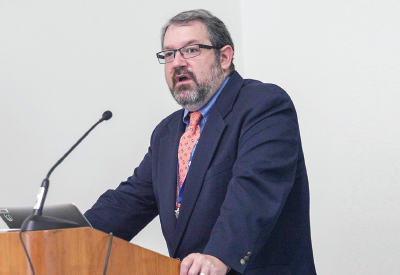The National Institute of Mental Health (NIMH) has experienced some big changes since Joshua Gordon, M.D., Ph.D., became the director last fall. In December 2016, then President Barack Obama signed the $6 billion 21st Century Cures Act into law, which among other things expanded funding for mental health research and strengthened enforcement of parity legislation. In January, the institute experienced its first administration transition under Gordon’s leadership, as President Donald Trump took office.
Addressing attendees at APA’s Annual Meeting in May, Gordon discussed the institute’s funding outlook and priorities for the future.
For 2017, NIMH received an $80 million boost in funding, $38 million of which is designated to the BRAIN (Brain Research through Advancing Innovative Neurotechnologies) Initiative. The passage of the 21st Century Cures Act secured additional funding through 2026 for the BRAIN Initiative and the Precision Medicine Initiative (PMI)—a program that aims to understand the role that an individual’s genetics, environment, and lifestyle can play in the prevention or treatment of disease.
“The budget picture is looking brighter,” Gordon said, noting that there are several points researchers should consider to best position themselves to receive support for their projects.
“The most important criteria for us is excellent science,” Gordon said. Just because a study is high risk, refutes existing dogma, or is expensive does not mean it will be rejected, if the underlying science is good, he added. “I would rather spend $1 million on a clinical trial whose results I can trust versus $500K only to find out that the ambiguous results mean starting all over.”
On the topic of trials, Gordon reminded the audience that NIMH has shifted toward an “experimental therapeutic” paradigm for intervention trials. As Gordon explained, the institute will no longer fund a study that solely looks to demonstrate different clinical effects. “We don’t want a situation where an intervention shows no effect, and the investigators say, ‘Well, we used the wrong dose or we didn’t pick the right population, but if we try again, it might work.’ Ideally, a negative finding should offer as much value as a positive result.”
Therefore, interventions need to first demonstrate some measurable effect on a biological target in humans; an experimental drug, for example, needs to show how it alters receptor activity. Then, the clinical trial assesses if the drug successfully engages the target receptor and how that relates to changes in symptoms.
The goal is that no matter the trial outcome, the findings add to existing knowledge by providing clues on how the intervention can be refined or modified moving forward.
Gordon then touched on another NIMH initiative of interest to APA, one that is tied to the question of how diagnoses are formulated—the Research Domain Criteria (RDoC).
While Gordon said he believes a rethinking of the mental health diagnostic system is warranted, he acknowledged that the RDoC implementation had several problems. The RDoC initiative was carried out in a top-down manner, with experts deciding what constitutes a “domain of mental behavior.”
Gordon said he wants to shift RDoC to be a bottom-up, data-driven project. “A DSM symptom or RDoC domain both likely reflect a dysfunction in a latent construct such as executive function or working memory,” he said. “These dysfunctions, in turn, reflect changes in brain physiological states, and those altered states have a root cause. We need to gain more information on those underlying causes.”
Switching to a data-driven model would require a tremendous number of biological and genetic samples, which could potentially be an expensive endeavor.
However, Gordon noted that some existing programs might be able to provide the data needed. Part of PMI, for example, is a program called All of Us. This program aims to recruit 1 million diverse Americans to provide biological samples and health information to create a national research resource. Researchers in any field could use this resource to study how individual differences in genetics, lifestyle, and environment influence health and disease.
“One of my goals is to ensure that All of Us is representative not only in traits like ethnicity, geography, and socioeconomics, but also in the volunteers’ mental health,” Gordon said.
He added that the Veterans Administration (VA) has a similar program under way called the Million Veteran Program. In the past, it has been difficult for outside groups to access VA data, but Gordon noted that in speaking with new VA Secretary David Shulkin, he is hopeful that collaboration and data sharing between the VA and NIMH will increase. ■

